Rights and obligations in case of damage occurring in Outer Space Conference

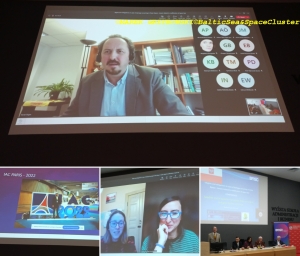
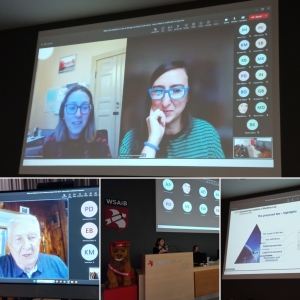
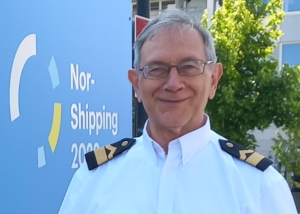 By Marek Grzybowski
By Marek Grzybowski
“Rights and obligations in case of damage occurring in Outer Space” in the auditorium of the University of Business and Administration. Eugeniusz Kwiatkowski (WSAiB) an international conference was held in Gdynia on November 23, 2023. The world has satellites to control what is happening on Earth, and Russia still bypasses sanctions by using illegal transport on the seas and oceans.
The guests were welcomed by Dr. Paweł Chyc, Prof. Edmund Wittbrodt and Dr. Michał Wierciński – vice-president of POLSA (Polish Space Agency). President Michał Wierciński said: the Polish space market is growing dynamically. He recalled that POLSA has existed for about 10 years. It serves not only the civilian sphere of our lives, but also the entire Polish space sector is of great importance to the Ministry of National Defense. The production of satellites must be cheaper so that we can use space better. Polish companies are getting involved in this process.
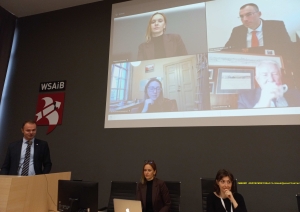
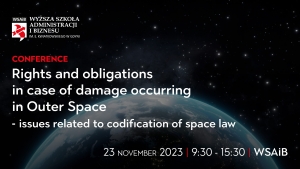
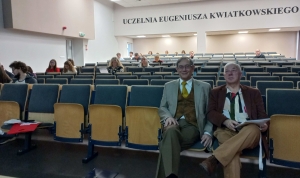
Rights and harms in space. Corporate social responsibility should also apply in space. The probability of satellites colliding with space debris is increasing. Work is ongoing on Polish space law. Satellites can be the target of a digital attack. In addition, there is the possibility of collisions. Over 20 years, the probability of a collision has increased 1,000 times.
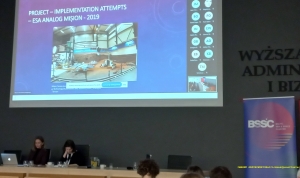


The scientific panel focused largely on business responsibility for what we do in space. The debate was moderated by Dr. Magdalena Konopacka – assistant professor at the Faculty of Law of the University of Business and Administration in Gdynia.
Prof. Javier Vercher Moll (University of Valencia) presented the issue: “Ensuring non-financial reporting”. Prof. Alla Pozdnakova (University of Oslo) presented on the topic: “Norwegian space legislation for a sustainable future – work in progress”. Dr. Aslihan Tekin, LL.M. (Vrije Universiteit Brussel, Human Rights Ombudsman) discussed the issue: “Navigating ESG and ED&I: Aligning space policies for a sustainable future.”
Prof. Krzysztof Drzewicki from the University of Gdańsk gave a lecture entitled: “Liability for damage caused to “Kosmos 954”. “Lessons Learned.” Prof. Marcin Dornowski from the Academy of Physical Education and Sport (AWFiS) Gdańsk discussed the University’s project, accepted for possible implementation by the Polish Space Agency and the European Space Agency: “Per Aspera ad Astra”.
Dr. Burak Ozgen, LL.M. (legal advisor to GESAC Brussels) gave a lecture entitled: “Generative Artificial Intelligence, Machine Learning and Intellectual Property Rights Challenges in EU Policy.” Dr. Rosa Manzo (University of Oslo) presented the issue: “The role of equality and justice in the dispute over space law.”
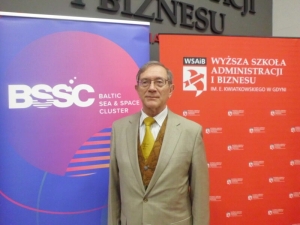
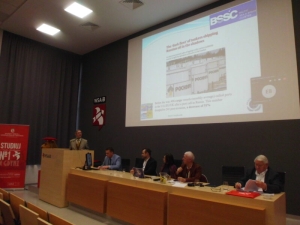

Panel II, expert, moderated by prof. Marek Grzybowski – president of the Baltic Maritime and Space Cluster. During this debate, the following issues were discussed, among others: the use of space technologies and law in maritime transport.
The panelists included: Dr. Bartosz Malinowski – Space Research Center of the Polish Academy of Sciences; prof. Zdzisław Brodecki – College of Administration and Business in Gdynia; Dr. Paweł Chyc – dean of the Faculty of Law at WSAiB in Gdynia; prof. Katarzyna Malinowska – Leon Koźmiński Academy; prof. Krzysztof Drzewicki – University of Gdańsk.
The conference topic “Rights and obligations in the event of damage occurring in outer space – issues related to the codification of space law”, also applies to damage resulting from satellites disrupting the activities of ports, maritime transport and global logistics. Disabling satellites may prevent the operation of ports and marine terminals, offshore installations, their protection, and even defense.
Another important element of economic security related to the use of satellites, computer science and artificial intelligence is the tracking of ghost ships. Vessels operating in the dark and gray fleets illegally transport Russian oil, gas or grain to or from places subject to sanctions. We can use satellite systems to track illegal operations. The system must be resistant to attacks and operational. Thanks to satellite technology and artificial intelligence and IT systems, even if a ship turns off its AIS identification device, its path and illegal STS operations can be tracked.
Currently, companies such as Lloyds List Intelligence and Windward, which track ship movements, have identified that we have around 1,000 ships that are illegally carrying oil, gas and grain between ports. But this is just the tip of the iceberg. There may be up to 5,000 ghost ships in the dark fleet and the gray fleet.
During the discussion, legislative issues related to running a private business and the possibility of transferring risks related to the provision of services related to the use of satellites and space technologies were also raised.
Photo: Kazimierz Netka, Krzysztof Anzelewicz
